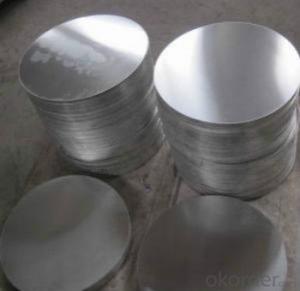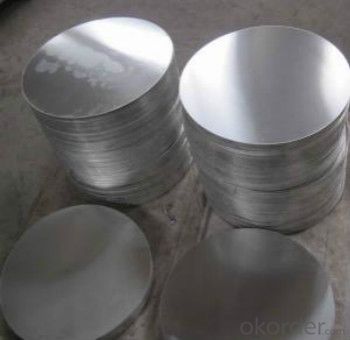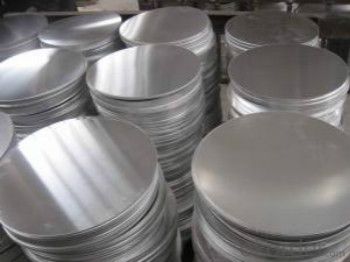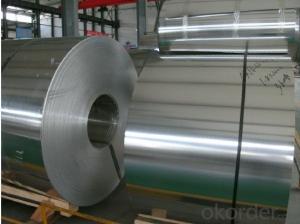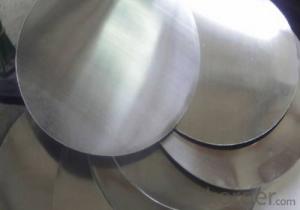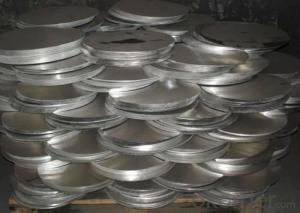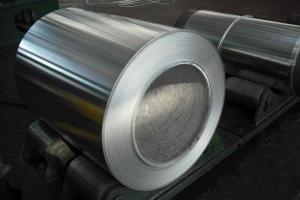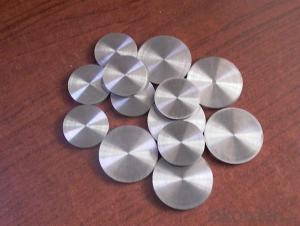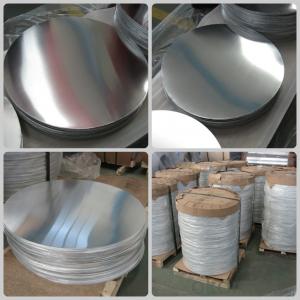5083 Aluminum Coils Wholesale Direct Casting Aluminum Circle for Pot
- Loading Port:
- Shanghai
- Payment Terms:
- TT OR LC
- Min Order Qty:
- 1 m.t.
- Supply Capability:
- 2000 m.t./month
OKorder Service Pledge
OKorder Financial Service
You Might Also Like
Specification
1. Structure of DC Aluminium in Coil Form for making Aluminium Circle Description
CC Aluminium in Coil Form for making Aluminium Circle is one semi-finished aluminium material. This coil can be rolled down to aluminium coil,sheet,circle ect. The alloy AA1050 is widly used in building, industry ect. Its weight is much lower than steel. So many customers choosed aluminium material instead of steel.
2. Feature of DC Aluminium in Coil Form for making Aluminium Circle
Surfact Quality :
Be free from Oil Stain, Dent, Inclusion, Scratches, Stain, Oxide Dicoloration, Breaks, Corrosion, Roll Marks, Dirt Streaks and other defect which will interfere with use,
Mechenical Property:
Chemical Composite and Mechanical Property
3. Image of DC Aluminium in Coil Form for making Aluminium Circle
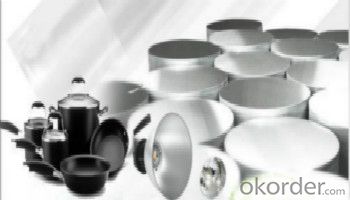
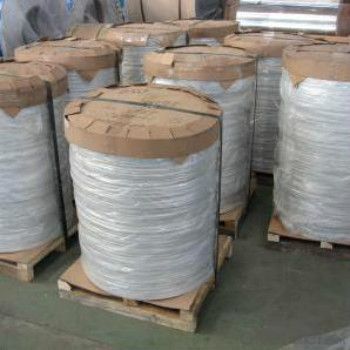
4. Specification of DC Aluminium in Coil Form for making Aluminium Circle
Aluminum Coil/Sheet | |
Main Specification | |
Alloy | AA1xxx (AA1050, AA1060, AA1070, AA1100 etc.) |
AA3xxx (AA3003, AA3004, AA3005, AA3105 etc.) | |
AA5xxx, AA6XXX (AA5052,AA5083, AA5754, AA6061, AA6062 etc.) | |
AA8xxx(AA8011, AA8006 etc.) | |
Temper | H14,H16, H18, H22, H24, H26, H32,O/F, T4, T6, T651 |
Thickmess | 0.01mm-100mm |
Width | 30mm-1700mm |
Standard | GB/T 3880-2006/ASTM |
Special specification is available on customer's requirement | |
5. FAQ
1) What is the delivery time?
Depends on actual order, around 20 to 35 days
2) What is the QC system:
We have QC staff of 20 persons and advanced equipment, each production is with MTC traced from Aluminum ingot lot.
3) What market do you mainly sell to?
Australia, America, Asia, Middle East, Western Europe, Africa etc
4)What about payment term?
30% T/T in advance, balance against B/L COPY.
- Q: Are aluminum coils suitable for manufacturing cookware?
- Aluminum coils, indeed, prove to be appropriate for the production of cookware. The reason behind aluminum's popularity in cookware lies in its exceptional heat conductivity, which results in uniform heating and efficient cooking. Moreover, its lightweight and sturdy nature make it convenient to handle and long-lasting. Additionally, aluminum possesses resistance against rust and corrosion, making it the perfect choice for cookware frequently exposed to water and heat. Nevertheless, it is crucial to acknowledge that uncoated aluminum cookware might react with certain acidic or alkaline foods, leading to a metallic taste. To tackle this issue, numerous aluminum cookware manufacturers utilize non-stick coatings or anodized finishes to prevent food reactions and enhance the cookware's durability. All in all, aluminum coils serve as a suitable material for the manufacture of cookware, but it is imperative to consider the specific requirements and coatings necessary for various types of cookware to ensure safety and optimal performance.
- Q: Are aluminum coils suitable for architectural roofing systems?
- Yes, aluminum coils are suitable for architectural roofing systems. Aluminum is lightweight, durable, and corrosion-resistant, making it an excellent choice for roofs. It can withstand harsh weather conditions, is easy to work with, and offers a range of design possibilities. Additionally, aluminum coils are available in a variety of colors and finishes, allowing for customization and enhancing the aesthetic appeal of architectural roofing systems.
- Q: What are the different grades of aluminum used in coil production?
- Coil production utilizes various grades of aluminum, each possessing its own unique properties and characteristics suitable for specific purposes. Some commonly employed grades include: 1. Commercially pure aluminum, known as 1100 Aluminum, excels in corrosion resistance and boasts high thermal conductivity. It finds applications in heat exchangers, fin stock, and evaporator coils. 2. 3003 Aluminum, alloyed with manganese, offers increased strength and durability compared to 1100 aluminum. Its formability and weldability properties make it suitable for a wide range of coil production applications, such as roofing, gutters, and general sheet metal work. 3. Magnesium alloyed 5052 Aluminum exhibits exceptional corrosion resistance and high strength. It is frequently utilized in marine applications like boat hulls and components, as well as architectural and automotive applications. 4. Renowned for its high strength and excellent machinability, 6061 Aluminum is considered one of the most versatile aluminum alloys. It commonly finds use in structural applications like aircraft parts, truck frames, and industrial equipment. 5. The aerospace and defense industries commonly rely on 7075 Aluminum, which offers one of the highest strength aluminum alloys. It demonstrates excellent fatigue resistance and is often employed in the production of aircraft wing spars, fuselage frames, and missile components. These examples highlight the diverse grades of aluminum employed in coil production. The selection of a specific grade depends on the desired properties and requirements of the intended application.
- Q: What are the energy efficiency benefits of aluminum coils?
- Aluminum coils offer a multitude of energy efficiency advantages, making them highly preferred across different industries. To begin with, aluminum possesses superb heat conductivity, enabling efficient transfer of thermal energy. This characteristic proves especially beneficial in the HVAC sector, where aluminum coils find wide usage in air conditioning and refrigeration systems. The high thermal conductivity of aluminum ensures swift absorption or release of heat, resulting in quicker cooling or heating processes and reduced energy usage. Moreover, aluminum coils exhibit exceptional resistance to corrosion, ensuring their long-term efficiency. Unlike other metals that may deteriorate when exposed to moisture or chemicals, aluminum remains unaffected, guaranteeing optimal heat transfer efficiency throughout the coil's lifespan. By preserving the coil's performance, energy losses arising from diminished heat transfer are minimized, leading to energy savings and improved system efficiency. Another notable advantage of aluminum coils lies in their lightweight nature. In comparison to traditional copper coils, aluminum coils are significantly lighter, making them easier to handle during installation and maintenance. The reduced weight also translates into lower energy requirements for transportation, resulting in decreased carbon emissions associated with shipping. Additionally, aluminum is a recyclable material, rendering it environmentally friendly and sustainable. The recycling process for aluminum necessitates considerably less energy compared to primary production, leading to reduced greenhouse gas emissions. By opting for aluminum coils, businesses can actively contribute to a more sustainable future by diminishing their carbon footprint. In conclusion, the energy efficiency benefits offered by aluminum coils are wide-ranging. Their exceptional thermal conductivity, corrosion resistance, lightweight nature, and recyclability make them an ideal choice for a variety of applications, resulting in decreased energy consumption, enhanced system performance, and a more sustainable environment.
- Q: How are aluminum coils cut and shaped?
- Aluminum coils are cut and shaped using various methods including shearing, slitting, and pressing. Shearing involves using sharp blades to cut the coil into desired lengths. Slitting is a process where the coil is fed through a machine with rotating circular blades that cut it into narrower strips. Pressing, on the other hand, involves using hydraulic or mechanical presses to shape the coil into specific forms through bending, punching, or forming. These techniques allow for precise cutting and shaping of aluminum coils, catering to different requirements and applications.
- Q: Can aluminum coils be formed or shaped?
- Yes, aluminum coils can be formed or shaped.
- Q: How are aluminum coils measured and specified?
- Several key factors are taken into account when measuring and specifying aluminum coils. Gauge or millimeters are typically used to measure the thickness of the coil, which determines its strength and durability. Thicker coils are more robust. The width of the coil, measured in inches or millimeters, is another important specification. It determines the size and coverage area of the coil, with wider coils offering greater coverage. The length of the coil is also crucial and is typically measured in feet or meters. It determines the amount of material available for a specific project. Longer coils are often preferred as they minimize the need for joints during installation. The aluminum alloy and temper used in the coil are specified as well. Different alloys have different mechanical and chemical properties, making them suitable for specific applications. The temper, which refers to the heat treatment process applied to the aluminum, affects its hardness and flexibility. The weight of the coil is an important consideration and is typically measured in pounds or kilograms. It determines the handling and transportation requirements for the coil. Lastly, the surface finish of the coil is specified. Common finishes include mill finish, which is untreated, and coated finishes such as painted or anodized. The surface finish affects the appearance and corrosion resistance of the coil. Overall, the measurement and specification of aluminum coils involve factors like thickness, width, length, alloy, temper, weight, and surface finish. These specifications ensure that the coils meet the desired requirements for various applications.
- Q: This question asks for a comparison of the benefits and drawbacks of utilizing aluminum coil in insulation applications.
- <p>Aluminum coil has several advantages for insulation, including its high thermal conductivity, which allows for efficient heat transfer, and its lightweight nature, making it easy to handle and install. It also offers good resistance to corrosion and is cost-effective compared to other materials. However, it has some disadvantages such as low strength, which may require additional support structures, and it can be prone to denting or damage if not handled carefully. Additionally, aluminum's high conductivity can lead to increased heat loss if not properly insulated, and it may require more frequent maintenance due to its susceptibility to environmental factors.</p>
- Q: Are aluminum coils resistant to chemicals?
- Yes, aluminum coils are generally resistant to chemicals. Aluminum has excellent corrosion resistance and can withstand exposure to various chemicals, making it a suitable choice for applications that involve chemical processing or storage.
- Q: What are the cost implications of using aluminum coils?
- The cost implications of using aluminum coils can vary depending on various factors. Firstly, aluminum coils tend to be more expensive than other types of coils, such as copper coils. This is mainly due to the higher cost of raw materials and the energy-intensive manufacturing process involved in producing aluminum coils. Therefore, the initial purchase cost of aluminum coils may be higher compared to other options. However, it is important to consider the long-term cost implications. Aluminum coils are known for their durability and resistance to corrosion, which can result in longer service life compared to other materials. This can lead to reduced maintenance and replacement costs over time. Additionally, aluminum is lightweight, making it easier to handle and transport, potentially reducing labor and transportation costs. Another cost implication to consider is the energy efficiency of aluminum coils. Aluminum has excellent heat transfer properties, allowing for efficient heat exchange in various applications, such as HVAC systems or refrigeration units. This can result in lower energy consumption and subsequently lower operating costs in the long run. Furthermore, aluminum is a highly recyclable material, which can contribute to cost savings and environmental benefits. Recycled aluminum can be used in the production of new coils, reducing the need for virgin materials and lowering overall costs. It is important to note that these cost implications may vary depending on the specific application and usage requirements. Factors such as the size of the system, installation complexity, and maintenance practices can also impact the overall cost-effectiveness of using aluminum coils. In summary, while aluminum coils may have a higher initial purchase cost, their durability, resistance to corrosion, energy efficiency, and recyclability can result in long-term cost savings and environmental benefits.
Send your message to us
5083 Aluminum Coils Wholesale Direct Casting Aluminum Circle for Pot
- Loading Port:
- Shanghai
- Payment Terms:
- TT OR LC
- Min Order Qty:
- 1 m.t.
- Supply Capability:
- 2000 m.t./month
OKorder Service Pledge
OKorder Financial Service
Similar products
Hot products
Hot Searches
Related keywords
